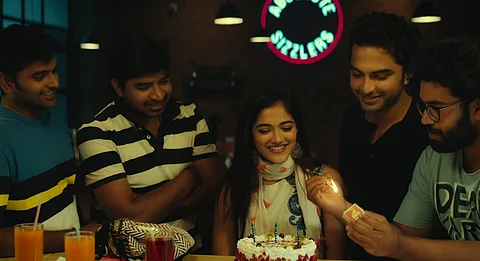
- Reviews
- Power List 2024
- Cannes 2024
- In-Depth Stories
- Web Stories
- News
- FC Lists
- Interviews
- Features
- FC SpecialsFC Specials

In 2018, when I saw Ee Nagaraniki Emaindi, I was super impressed by one thing in the film and that has remained my most memorable takeaway—its interval sequence. This sequence shows Tharun Bhasckar's creativity in telling a storyTharun Bhasckar's creativity in telling a story. Visual narrative might sometimes be tricky to understand but it is definitely appealing and intriguing. The 2 minutes 6 seconds long sequence is a great use of the montage, presented in the most entertaining way.
The sequence begins with the transition of frames from the title of the film Ee Nagaraniki Emaindi, which means two things—one, what is happening with these bunch of drunk, messy boys in the story and two, it is a tip off for the audience to look forward to what would happen to these filmmakers dealing with personal conflicts. The title and this interval sequence are metaphorical in many ways.
The staging of this sequence shows the beauty of filmmaking and the work done by different departments. The top angle framing and colour pallet by cinematographer Niketh Bommireddy holds your attention, even as production designer Latha Tharun tells a larger story than the actors themselves in that sequence. This is because it looks, sounds and feels novel and fresh. The dialogues in the sequence not only makes one giggle for it's subtle comedy but also gives an edge-of-the-seat feeling. Energetic peppy music by Vivek Sagar fuels the sequence to create an interval bang. The scenes are written and structured in way that the audience are so hooked, that they want the break to be over soon.
As mentioned earlier, blocking in this interval sequence showcases a lot more than what meets the eye. Karthik (Sushanth Reddy) is placed at the centre of the frame, suggesting the problems around his impending wedding as the central conflict of the film. He is lying still on the ground, symbolising his constant presence throughout the story. The film begins and ends with Karthik's conflict and it's resolution. Also, like in the sequence, he binds his three friends to stay hooked together.
If Karthik is the cause, Vivek is the effect. Though we see Vivek (Vishwak Sen) struggling with an internal battle of low self esteem, he is the torch bearer who takes the story to greater heights. To draw parallels, Vivek mobilises Uppu and Kaushik to celebrate Karthik's bachelor party in Goa; likewise every time Team Kanya Rasi attempts to make a film, it is Vivek who writes and directs it. Even in the climax where Karthik is settling for a virtual engagement in the police station, it is Vivek who aggravates the argument and brings in a moment of realization for him. Therefore, Vivek plays a vital role in taking the story forward.
Coming to everyone's favourite Kaushik (Abhinav Gomatam), he is the chill guy who is equally serious and carefree about things at the same time. He is that friend in the gang who is up for all the doings. This interval sequence too carries the same vibe. A beautiful analogy between the stealing of the camera lens from the photoshop (post Karthik's mood off) and his dialogue to Uppu in this interval sequence "Nuvvu endhi ra PT teacher lekka act chestunnav, strict ga?! Yeltunnamu anthe!!" shows how he uplifts the events by dismissing all the odds and logic. Largely, it is the dialogues and Kaushik's timing that makes ENE the special film it is and we all would love to have a friend like him.
Uppu (Venkatesh Kakumanu) is the timid guy in the group whose contributions to the story are always implicit. Being an editor by profession, Uppu always tries to bring the mess together to make it better. Whether it is trying to settle the bill at the bar or his initiative to drive the car till Goa in the interval sequence, he is trying to put things "in his own words" (If you know, you know).
Lastly, the entire interval sequence has multiple scenes staged at various places. These scenes portray their transitional journey from a get-together at a bar to celebrating the bachelor party in Goa. Similarly, it epitomizes the repeated progressive struggle of these boys towards resolving their personal conflicts and following their passion to make films. There's only one thing I'd like to say about this interval sequence to Mr. Bhasckar, "Mike! Baaga pagatubandi ga plan chesavu, Mike!"